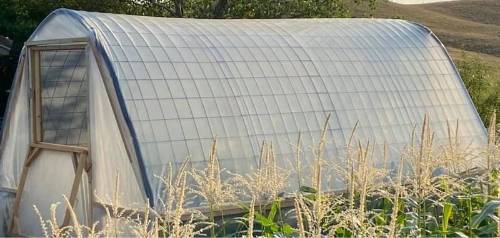High Tunnels on The Fort Belknap Reservation
Plant Care, Season Extension, and Healthy Food
The Fort Belknap Reservation MSU Extension Program has been fortunate to be a part of a growing initiative (pun intended) toward food security and expanding local food production. In 2015, community members in Lodgepole accessed a small grant through First Nations Development Institute for the establishment of a community garden high tunnel, and local efforts have continued to expand. In 2016, Fort Belknap MSU Extension received a grant from the Food Distribution Program on Indian Reservations (FDPIR) that placed high tunnels on six home gardens. Although agents and community members have worked with the local NRCS office to access high tunnel cost-share programs and resources, there were several regulatory barriers to the successful completion of that effort. Nevertheless, gardeners forged ahead and found affordable and well-built options to continue their plan.
A seasonal high tunnel system is a polyethylene (plastic) covered structure that is used to cover crops to extend the growing season. It is also known as a high tunnel or hoop house. The seasonal high tunnel system depends on the plastic covering to raise temperatures within the structure. The benefits include an extended growing season, an improvement in plant and soil quality, maximized efficiency in water and nutrient use, protection from wind, a reduction in energy use, and improved air quality along with providing consumers with local produce. Supportive practices that are easily implemented in a high tunnel setting are mulching, micro irrigation, targeted soil amendments, and the use of compost.

The high tunnel also becomes an effective learning space for both children and adults, allowing for interactive, on-site demonstration of MSU Extension programming and practices. MSU Extension Agents Liz Werk and Hillary Maxwell, and SNAP-Ed Nutrition Educator Ramona King, have all used the high tunnel space for a unique and interesting hands-on environment to share learning opportunities. Community members have also weighed in on the benefits. John and Becky Andrews of Lodgepole built their own high tunnel for their home garden, invited others to visit, and shared their construction plans.
John said, “We chose to build our high tunnel because of the frustration of losing crops that needed more time to produce well. In our area we have a wide range of temperature fluctuations in the spring and fall so it is hard to get some crops to produce well because of frosts and the temperatures needed in the spring for a good pollination set, such as with tomatoes and peppers. In using the high tunnel, built last spring, we really enjoyed seeing a good harvest of vegetables. It also opens up space outdoors for our other vegetables that are more temperature tolerant or have shorter growing seasons. We look forward to planting early this coming spring and to planting earlier than we have been able to, in the past. On another side note, we enjoyed building the high tunnel as a project, and the cost wasn’t beyond our reach, it was affordable. It held up to the high winds pretty well.”
Craig Shambo of Hays built the high tunnel at the Hays Community Garden using PVC and lumber. He always looks forward to growing cucumbers to make his famous bread and butter pickles in our food preservation classes. Barb Cliff maintains the Lodgepole Community Garden high tunnel, has enjoyed early produce, such as spinach and onions, and is also able to successfully begin a seed-saving initiative within the high tunnel’s protected growing environment. Kayla Tandy, the MSU Extension intern in 2021, built a high tunnel with students at the Mission School in Hays, and used the tunnel as a learning location. All the community garden high tunnels produce food that is provided to anyone in the community. Three other home gardeners have completed high tunnels in 2021, and we look forward to an even greater expansion in 2022.
MSU Extension staff, with the considerable support of community members, have continued to advance the impacts of Fort Belknap’s community and home gardens, research orchard, food preservation leaders, and high tunnel expansion. This year, new partnerships with Department of Natural Resources and Conservation funded the creation of 10 food forests on the reservation. The collaboration with Nakoda Aaniiih Economic Development Corporation to create and staff a food sovereignty coordinator position and add three new high tunnels is underway.
Coordinator Randi Wing-Fetter said, “As Nakoda and Aaniiih people, we would like to extend our growing season with the high tunnel technology and combine this with the efforts in teaching our youth and keeping our culture alive.”
As we go forward, we believe the high tunnels will perform an excellent function in growing more fruits and vegetables in Montana, and we anticipate increased participation, collaboration, and learning opportunities. Reach out and learn more about the work at Fort Belknap by calling (406) 353-2656 or emailing hillary.maxwell@montana.edu.
Hillary Maxwell is an MSU Extension Agent on the Fort Belknap Reservation
